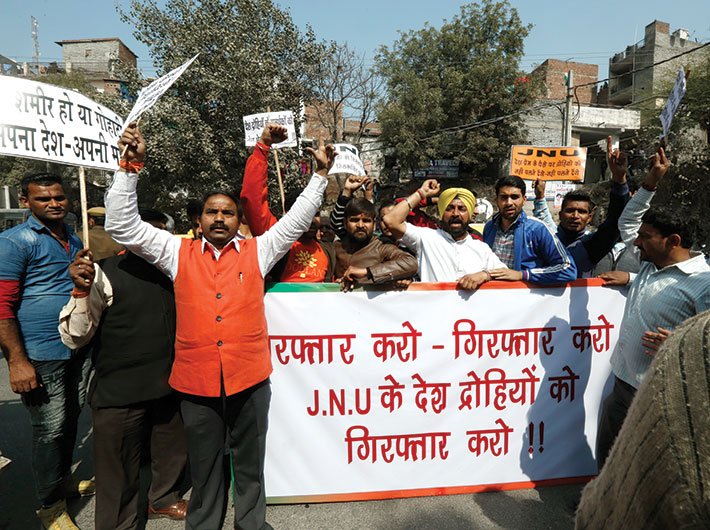The JNU case can be a catalyst to further the debate on the law, which was relaxed even by the British during Quit India movement
The arrest of JNU students under section 124A of the Indian penal code (IPC) for protesting against the execution of parliament attack convict Afzal Guru has kicked off a debate over the relevance of the colonial provision in a democracy. While it would not be tough to justify the arrests given the broad ambit of the law introduced by the British to deal with freedom fighters, it may not be easy for the government to defend sedition which continues to be an offence despite not finding favour with the founding fathers of our constitution.
Sedition was proposed as one of the grounds under article 19(2) on which freedom of speech and expression guaranteed under article 19(1)(a) could be curbed, but the constituent assembly took a conscious decision to drop it. While proposing an amendment to delete sedition from the draft, assembly member KM Munshi said if the provision was allowed to stay, “an erroneous impression would be created that we want to perpetuate 124A of the IPC or its meaning which was considered good law in earlier days”.
Munshi was backed by several other members – some of whom like Seth Govind Das had faced imprisonment for sedition. They did not want any mention of sedition as it was used to harass freedom fighters and had “delayed” independence.
Some members like Jadubans Sahay supported curbs on free speech on the ground of sedition to deal with the threat of “communists” and other forces. “If the country does not exist, where is the civil liberty?” he asked.
But Sahay clearly did not see sedition as a tool to stifle dissent. “The sedition law was there but it was changed in course of time. A few words said 25 years ago used to come under the Sedition Act, but in 1942 even the ‘Quit India’ slogans and all the other criticisms were not considered seditious,” he said on November 22, 1949.
The votaries of free speech in the constituent assembly won but the celebration did not last long with the Nehru government introducing the first amendment to the constitution in 1951. With two supreme court judgments holding that freedom of speech could be curbed only on grounds provided for in article 19(2), the Nehru government decided to insert ‘public order’ as one of the grounds to curb freedom of speech and expression.
The statement of objects and reasons appended to the Constitution (first amendment) Act, 1951, specifically talked about the enlarged scope of speech and expression following the two judgments. “The citizen’s right to freedom of speech and expression guaranteed by article 19(1)(a) has been held by some courts to be so comprehensive as not to render a person culpable even if he advocates murder and other crimes of violence,” it said.
Nehru was aware of the reasons behind the constituent assembly deciding against incorporating public order as a ground for curbing free speech. While introducing the amendment in parliament, he said: “Take again section 124A of the Indian penal code. Now so far as I am concerned that particular section is highly objectionable and obnoxious and it should have no place both for practical and historical reasons, if you like, in any body of laws that we might pass. The sooner we get rid of it the better.”
“I do not think myself that these changes that we bring about validate the thing to any large extent,” he added, referring to sedition.
The amendment, however, apparently gave a foothold to section 124A after independence. In the Kedar Nath Singh case of 1962, the supreme court upheld the constitutional validity of section 124A while restricting its application to only activities involving incitement to violence or intention or tendency to create public disorder or cause disturbance of public peace. Ironically, Singh had been charged with sedition for talking about a revolution to overthrow the Congress government under Nehru.
The 1962 judgment read down section 124A to limit its application to preserve public order. Though this has minimised chances of conviction, the broad ambit of section 124A still leaves scope for harassment of those writing against the government, organising mass movements, indulging in legitimate protests or sympathising with the cause of the downtrodden.
Sedition, according to section 124A, means promoting or attempting to promote – through words, visible representation or “otherwise” – hatred, contempt or disaffection towards the government.
With the safeguard spelt out by the supreme court not coming to rescue at the time of arrest or investigation, the invocation of the provision has often led to debates questioning the rationale behind continuing with the provision which even the British government found hard to justify.
In 1897, there was stiff resistance to an amendment to broaden the ambit of section 124A taking into account the defence of Bal Gangadhar Tilak. Defending the amendment which basically gave the law the present form, Mr Chalmers, member-in-charge of the bill, said: “Language may be tolerated in England which it is unsafe to tolerate in India, because in India it is apt to be transformed into action instead of passing off as harmless gas.”
The charges under section 124A were only a matter of pride for freedom fighters who looked upon Tilak and Gandhi as their leaders, both of whom suffered incarceration but had put section 124A in the dock. Taking into account Tilak’s defence, the words ‘hatred or contempt’ were added to the word ‘disaffection’ in section 124A among other changes introduced in 1898.
The law failed to serve the purpose of stifling dissent. After being sentenced, Tilak once said that “the cause I represent may prosper more by my suffering than by my remaining free.”
Gandhi, who was charged later in 1922, decided not to defend himself and accepted guilt without facing trial. “I know that some of the most loved of India’s patriots have been convicted under it. I consider it a privilege, therefore, to be charged under that section,” he told the judge, stating that the crime, according to him, was the “highest duty” of a citizen.
He referred to section 124A as “the prince among the political sections… designed to suppress the liberty of the citizen”. Over six decades after independence, governments continue to face the charge of stifling dissent by invoking the same provision.
No doubt, a charge under sedition arouses more dissent than it seeks to suppress. The JNU case is another example and it should act as a catalyst to take forward the debate. The fact that the constitutional validity of section 124A has been upheld does not make it a good law.
We can easily do without the provision as there are several other offences like waging and even attempting to wage war in the chapter dealing with ‘offences against the state’ in the penal code. Any serious case of sedition likely to threaten public order can easily fall under waging or attempting to wage war.
The draft IPC had sedition as an offence but it was not considered necessary and was dropped before the enactment of the code in 1860. It was, subsequently, introduced by the colonial government in 1870. Justifying the introduction of section 124A ten years later, James Stephen said, “The law relating to riots and unlawful assemblies is very full and elaborate, but it is remarkable that the penal code contained no provision at all as to seditious offences not involving an absolute breach of the peace.”
The idea clearly was to curb free speech and not to deal with likely breach of peace which had been taken care of by other provisions.
(The article appears in the March 1-15, 2016 issue)



